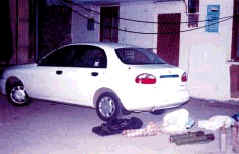|
The Aden 'bomb plot',
December 1998
Text last
updated 14 February 1999
IT BEGAN two nights
before Christmas. Around midnight, a white Daewoo car with three people inside drove into
Aden from Abyan. Arriving at a traffic roundabout, the car went round in a clockwise
direction - a bizarre mistake for a Yemeni driver but one that a British driver,
accustomed to travelling on the left, could easily make.
A traffic policeman stopped the car and asked the driver for his
licence. But instead of handing the officer a few riyals to forget about it as most
Yemenis would do, the driver suddenly accelerated away and a chase ensued.
Had it not been for this small traffic incident, events
would have turned out very differently. If the Yemeni authorities' claim is correct,
Christmas Day would have brought bombings and slaughter to Aden on a huge scale. Several
of the places where western Christians would gather for their festivities were targeted:
the Anglican church, a restaurant popular with foreigners, and the Moevenpick hotel. The
British consulate, a UN office and a hotel used by American forces helping to clear
land-mines were also allegedly on the list.
But the plot - if that's what it was - failed. The Daewoo
car, allegedly with Malik Nasser Harhara from
Birmingham at the wheel, sped on for a few minutes until it collided with another vehicle
near a petrol station and its occupants ran off. Police arrived and opened the car boot,
where they say they found explosives and guns. Shortly after that five
Britons were arrested, along with an Algerian who had arrived from Britain
with a false French passport. Harhara from
Birmingham at the wheel, sped on for a few minutes until it collided with another vehicle
near a petrol station and its occupants ran off. Police arrived and opened the car boot,
where they say they found explosives and guns. Shortly after that five
Britons were arrested, along with an Algerian who had arrived from Britain
with a false French passport.
On January 27, following a siege in Abyan, three more
Britons were arrested, along with a second Algerian who had arrived from Britain with a
false French passport (and also two other men who were wanted in connection with the
tourists' kidnapping).
The ten are now on trial in Aden, charged with
"membership of an armed group and possession of weapons, explosives and unauthorised
international communications devices, as well as starting to commit acts of sabotage
against Yemeni and foreign interests in Aden." Nine of the men deny all the charges.
One has admitted membership of an armed group but denies the other charges. Their families
say they had simply gone to Yemen for holidays or to improve their Arabic.
Aden police say that up to 14 people from Britain used a
two-storey, three-bedroom suburban villa as a terrorist safe house. It was built for RAF
officers before the British withdrawal from Aden1967. Muhsin Ghailan allegedly paid
£1,250 in cash to rent it for six months and asked for a 10-foot stone wall to be built
around it. He said it would be used to accommodate British Muslims who wanted to study
Arabic.
A lawyer who drew up the rental contract said Ghailan,
Harhara and the Algerian visited his office in early December. Neighbours identified Abu
Hamza's son, Mustapha Kamil, as being in a rented Daewoo which shuttled to and from the
villa. Hours after his arrest police drove Ghailan around Aden until he identified the
villa. Police say the villa contained Yemeni army uniforms. They say Ghailan also rented a
house in Sana'a.
The arrested men, according to the Yemeni authorities, are
linked to two key figures: Abu Hamza al-Masri,
an imam at Finsbury Park mosque in London, who is also leader of a group called Supporters
of Shariah (SOS), and Abu al-Hassan al-Mihdar,
self-styled commander and founder of the Islamic Army of Aden-Abyan.
The Britons allegedly went to Yemen at the behest of Abu
Hamza, where they made contact with Abu al-Hassan. Four days after the Britons were
arrested, Abu al-Hassan and his supporters kidnapped 16
mainly British tourists in Abyan, in the hope of exchanging his hostages for
the arrested men.
Some of the alleged links rely on the confessions of those
arrested, which have since been withdrawn because, it is claimed, they were obtained
through torture. However, there is some information from other sources:
-
One of the arrested Britons, 17-year-old Mustapha Kamil, is
Abu Hamza's son. In court, he has admitted membership of an armed group.
|